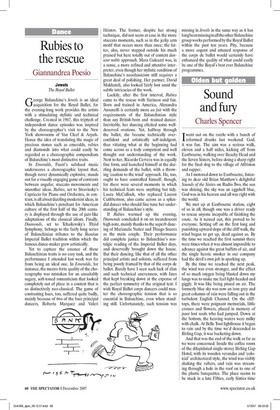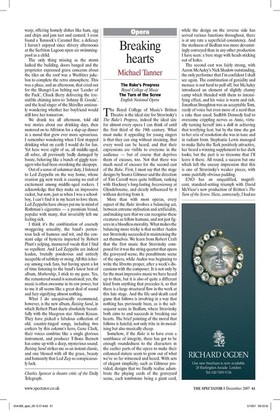Sound and fury
Charles Spencer Iwent out on the razzle with a bunch of reformed drunks last weekend. God, it was fun. The aim was a serious walk, eleven and a half miles, kicking off from Eastbourne, walking over Beachy Head and the Seven Sisters, before doing a sharp right for the final slog to the village of Alfriston and supper.
As I motored down to Eastbourne, listening to dear old Brian Matthew's delightful Sounds of the Sixties on Radio Two, the sun was shining, the sky was an eggshell blue, God was in his heaven and all was right with the world.
We met up at Eastbourne station, eight of us in all, though one was a driver ready to rescue anyone incapable of finishing the route. As it turned out, this proved to be everyone. Setting off on the first long and punishing upward slope of the cliff walk, the wind began to get up, dead against us. By the time we reached the first summit there were times when it was almost impossible to advance against the great buffets of air, and the single heroic smoker in our company had the devil's own job in sparking up.
By the time we reached the next peak, the wind was even stronger, and the effect of so much oxygen being blasted down my lungs was to make me feel light-headed and giggly. It was like being pissed on air. The formerly blue sky was now an iron grey and great columns of rain were falling out in the turbulent English Channel. On the clifftops, there were poignant memorials, little crosses and flowers, placed in memory of poor lost souls who had jumped. Down at the bottom, the heaving waters were milky with chalk. At Belle Tout lighthouse it began to rain and by the time we'd descended to Birling Gap, it was bucketing down.
And that was the end of the walk as far as we were concerned. Inside the coffee room of the dilapidated single-storey Birling Gap Hotel, with its wooden verandas and 'colonial' architectural style, the wind was visibly shaking the rafters, and rain was streaming through a hole in the roof on to one of the plastic banquettes. The place seems to be stuck in a late Fifties, early Sixties time warp, offering homely dishes like ham, egg and chips and jam tart and custard. I even found a Tunnock's Caramel Bar, a delicacy I haven't enjoyed since shivery afternoons at the Surbiton Lagoon open-air swimmingpool as a child.
The only thing missing as the storm lashed the building, doors banged and the proprietor expressed grave concerns about the tiles on the roof was a Wurlitzer jukebox to complete the retro atmosphere. This was a place, and an afternoon, that cried out for the Shangri-Las belting out 'Leader of the Pack', Chuck Berry delivering the irresistible chiming intro to 'Johnny B. Goode', and the lead singer of the Shirelles anxiously wondering whether her boyfriend would still love her tomorrow.
We drank tea all afternoon, told old war stories about our drinking days, then motored on to Alfriston for a slap-up dinner in a mood that grew ever more uproarious. I remember wondering when I first stopped drinking what on earth I would do for fun. Yet here were eight of us, all middle-aged, all sober, all previously badly damaged by booze, behaving like a bunch of giggly teenagers who had been overdoing the alcopops.
Out of a sense of columnar duty, I listened to Led Zeppelin on the way home, whose reunion gig next week is causing no end of excitement among middle-aged rockers. I acknowledge that they make an impressive racket, but now, just as when I was a schoolboy, I can't find it in my heart to love them. Led Zeppelin have always put me in mind of Rothman's cigarettes — a premium brand, popular with many, that invariably left me feeling sick.
I think it's the combination of coarsely swaggering sexuality, the band's portentous lack of humour and wit, and the constant edge of hysteria imparted by Robert Plant's yelping, mannered vocals that I find so repellent. And Led Zeppelin are indeed leaden, brutally ponderous and entirely incapable of subtlety or swing. All this is heresy among rock fans, but having spent a lot of time listening to the band's latest best-of album, Mothership, I stick to my guns. Yes, the remastered sound is sensational; yes, the music is often awesome in its raw power, but to me it all seems like a great deal of sound and fury signifying almost nothing.
What I do unequivocally recommend, however, is the new album, Raising Sand, in which Robert Plant duets absolutely beautifully with the bluegrass star Alison Krauss. They have picked a fabulous collection of old, country-tinged songs, including two corkers by this column's hero, Gene Clark, their voices combine like a single glorious instrument, and producer T-Bone Burnett has come up with a deep, mysterious sound. Raising Sand strikes me as an instant classic, and one blessed with all the grace, beauty and humanity that Led Zep so conspicuously lack.
Charles Spencer is theatre critic of the Daily Telegraph.


























































 Previous page
Previous page